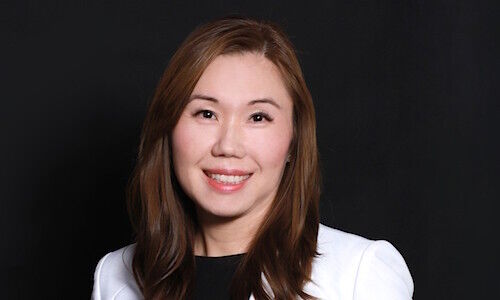Christina Boeck: «Without Risk There's No Risk Premium to Be Had»
It is always impressive to see how wrong humans, and in particular male investors, are about their past performance, writes Christina Boeck in an exclusive essay for finews.first.
finews.first is a forum for renowned authors specialized on economic and financial topics. The publishers of finews.asia are responsible for the selection.
In the year so far, Eurostoxx 50 has had a significantly negative performance and the benchmark Swiss Market Index also is clearly in the red. The erstwhile sense of security among investors has received a dampener from global stock markets and the nervous tension on the markets is rising.
The financial media is publishing warnings about a coming change of market trend. Market gurus are predicting the next U.S. recession for 2020 and hedging strategies have become the flavor of the time.
«You have to be able to hold out for three years»
If you feel a sense of unease about a coming big correction, you should rethink your strategic, long-term investment allocation – not tactically, but fundamentally. Because it probably is structurally not right, if a high percentage of equities make you worry.
A bear market can easily last for three years. You have to be able to hold out without having to sell in the meantime. It is particularly important not to be forced to reduce your risk level at the weakest moment due to external factors – and that means to be certain about your clients' and management's ability to hold out.
«Each analysis can be refuted»
The analyses written by economists and strategists make great sense. Often enough these texts are rhetorically very well written. But you could just as well refute every single one of them by lending more weight to other arguments. One says that the signs of a cyclical weakening in China will have a very strong influence globally. Another believes that the timid analyses of the economy are tainted because the economic cycle since the global financial crisis was an exceptional situation with growth slower but longer-lasting and therefore it has to be judged differently altogether.
It is always impressive to see how wrong humans, and in particular (male) investors, are about their past performance – remembering the great coups of having sold on the day before the correction. Even if this happens only one in ten times and the other nine are forgotten about.
«The only result are unnecessary costs»
There have been many studies about the performance of portfolio managers since Sharpe. The phenomenon about overconfidence has been proven for a wide range of peoples and for all sorts of investment decisions. The only tangible result of the frequent tactical dealing based on overconfidence are significantly higher, and yet unnecessary transaction costs.
The point about the missed ten days is often taken as an argument against tactical trading. According to this theory, an investor in the Standard & Poor's index between 1995 and 2014 will have earned a yield of 555 percent with an uninterrupted investment, but only one of 191 percent if he hadn't been invested in the ten days with the best performance.
«There is still no such thing as a free lunch»
The conclusion is to remain invested at all times in order not to risk missing those ten best days. However, this analysis falls short, because the extreme days occur in clusters in the volatile times, in other words empirically in times of falling prices. Many banks are advertizing their ability to predict the volatile periods, helping their customers improving their performance significantly. The proof for this ability has yet to be presented.
The real reason why one ought to stick to a strategic allocation even during today's supposedly bigger risk is that the word risk premium is living up to its name – you will only earn your premium if you take the risk. Equities have a real risk premium compared with cash and bonds but for that you need to remain invested. Without the risk there is no risk premium to be had. There is still no such thing as a free lunch.
Christina Boeck for many years was chief investment officer (CIO) at Axa Investment Managers and at Profond collective foundation. She studied in Germany, England and France. She earned a Master in Management at H.E.C. in Paris.
Previous contributions: Rudi Bogni, Peter Kurer, Oliver Berger, Rolf Banz, Dieter Ruloff, Werner Vogt, Walter Wittmann, Alfred Mettler, Peter Hody, Robert Holzach, Craig Murray, David Zollinger, Arthur Bolliger, Beat Kappeler, Chris Rowe, Stefan Gerlach, Marc Lussy, Nuno Fernandes, Richard Egger, Maurice Pedergnana, Marco Bargel, Steve Hanke, Andreas Britt, Urs Schoettli, Ursula Finsterwald, Stefan Kreuzkamp, Oliver Bussmann, Michael Benz, Peter Hody, Albert Steck, Andreas Britt, Martin Dahinden, Thomas Fedier, Alfred Mettler, Brigitte Strebel, Peter Hody, Mirjam Staub-Bisang, Nicolas Roth, Thorsten Polleit, Kim Iskyan, Stephen Dover, Denise Kenyon-Rouvinez, Christian Dreyer, Kinan Khadam-Al-Jame, Robert Hemmi, Anton Affentranger, Yves Mirabaud, Katharina Bart, Frédéric Papp, Hans-Martin Kraus, Gerard Guerdat, Didier Saint-Georges, Mario Bassi, Stephen Thariyan, Dan Steinbock, Rino Borini, Bert Flossbach, Michael Hasenstab, Guido Schilling, Werner E. Rutsch, Dorte Bech Vizard, Adriano B. Lucatelli, Katharina Bart, Maya Bhandari, Jean Tirole, Hans Jakob Roth, Marco Martinelli, Beat Wittmann, Thomas Sutter, Tom King, Werner Peyer, Thomas Kupfer, Peter Kurer, Arturo Bris, Frederic Papp, Claudia Kraaz, James Syme, Peter Hody, Dennis Larsen, Bernd Kramer, Ralph Ebert, Marionna Wegenstein, Armin Jans, Nicolas Roth, Hans Ulrich Jost, Patrick Hunger, Fabrizio Quirighetti, Claire Shaw, Peter Fanconi, Alex Wolf, Dan Steinbock, Patrick Scheurle, Sandro Occhilupo, Claudia Kraaz, Will Ballard, Michael Bornhäusser, Nicholas Yeo, Claude-Alain Margelisch, Jean-François Hirschel, Jens Pongratz, Samuel Gerber, Philipp Weckherlin, Michel Longhini, Anne Richards, Michael Welti, Antoni Trenchev, Benoit Barbereau, Pascal R. Bersier, Shaul Lifshitz, Klaus Breiner, Ana Botín, Michel Longhini, Martin Gilbert, Jesper Koll, Ingo Rauser, Carlo Capaul, Claude Baumann, Markus Winkler, Konrad Hummler, Thomas Steinemann, Karin M. Klossek and Michael Welti.



























